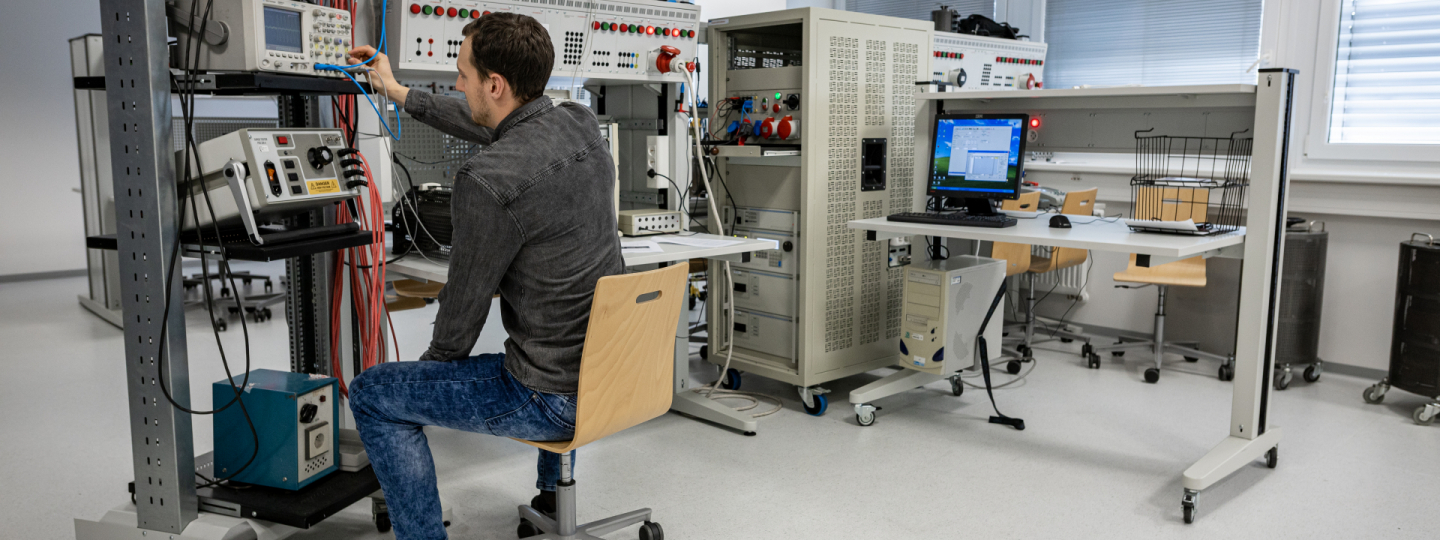Lecture laboratories

Students are educated in modern and well-equipped laboratories on our faculty campus. Take a look at a few examples of what you could learn here.
Solar laboratory
The laboratory is focused on the operational characteristics of renewable energy sources, their efficient and correct system integration, including evaluation, determination and verification of required parameters. Students have the opportunity to understand the basic principles of design and functionality of photovoltaic, wind and accumulation systems. Within this laboratory, bachelor's and master's theses can be also carried out.
High voltage laboratory
In the high voltage laboratory, students learn the basics of material diagnostics and general testing of high-voltage power equipment. The laboratory is very well equipped with test AC and pulse sources, with which it is possible to perform testing of equipment up to a nominal voltage level of 110 kV. Furthermore, the laboratories are equipped with a partial discharge tester and tools for measuring electrical parameters and electrical strength of solid and liquid dielectrics. In addition to the above, the laboratory offers the opportunity to get acquainted with other accompanying phenomena related to the use of high voltage. Most of the acquired knowledge has a direct practical application in testing laboratories and other experimental laboratories. In this facility, students can also work on their final theses.
Power quality and EMC laboratory
The laboratory is used for practical teaching in the subject of power quality and EMC and during the work on bachelor's and master's theses. The laboratory is focused on the demonstration and analysis of the causes and consequences of phenomena determining and determined by the power quality. In a modern and technically advanced laboratory, students learn to understand the basics of electromagnetic compatibility. The laboratory is equipped with top power generators, testers and measuring systems and simulators, some of which were assembled as part of the final student work.
Laboratory of nuclear power engineering and ionizing radiation
In this laboratory, students will learn basic concepts in the field of radiation protection, the interaction of ionizing radiation with matter and the detection of this radiation, and in particular they will acquire correct habits for work with radioactivity. There are various types of alpha, beta, gamma and neutron radiation detectors in the laboratory; students will learn to work with these detectors, operate control software and process measured data. They will understand basic concepts such as dead time of a detector, multichannel analysis or detector calibration. Thanks to the neutron source, which is available in the laboratory of nuclear energy and ionizing radiation, students will gain a basic idea of the materials activation in nuclear reactors, the measurement of induced activity, reaction rates, half-lives and other variables. With the help of a loop for studying critical heat fluxes on smooth and modified surfaces (Mobile Research Critical Heat flux Apparatus), students will understand what a boiling crisis is and how it is related to nuclear safety.
Light laboratory
In the laboratory, students learn to measure the basic parameters of light sources and luminaires and verify the basic photometric laws. The laboratory has the integrating sphere on which students measure the luminous efficiency of light sources, the goniophotometer for the luminous intensity distribution measurement of the luminaires, luxmeters of various accuracy classes for the measuring illuminance and illumination uniformity, spectroradiometers for the spectral power distribution measurement of different light sources, the spectrophotometer for the measuring spectral reflectances of various materials, the luminance and chroma meters for the measuring luminance and colorimetric quantities.
Electrical protection laboratory
The laboratory is mainly focused on the configuration and testing of electrical protections. It is used for teaching several subjects and bachelor's and master's theses are also prepared here. The equipment of the laboratory is above standard, students can try working with digital and analog protections, primary and secondary protection testers, and there are also models of the substation and distribution network.
Laboratory of power and data networks design
The laboratory is focused on the design, assembly, and programming of intelligent electrical installations. Within this laboratory, BPC-PSD, BKC-PSD, MPC-PSD and BPC-ZES courses are taught. The laboratory also prepares bachelor's and master's theses on the design and optimization of intelligent installations and the cooperation of various elements connected within the installation.





































